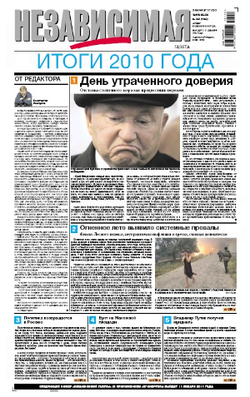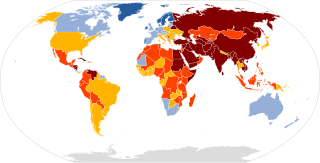Journalism is the production and distribution of reports on the interaction of events, facts, ideas, and people that are the "news of the day" and that informs society to at least some degree of accuracy. The word, a noun, applies to the occupation, the methods of gathering information, and the organizing literary styles.

Haaretz is an Israeli newspaper. It was founded in 1918, making it the longest running newspaper currently in print in Israel. It is published in both Hebrew and English in the Berliner format. The English edition is published and sold together with The New York Times International Edition. Its Hebrew and English editions are available on the internet. In North America, it is published as a weekly newspaper, combining articles from the Friday edition with a roundup from the rest of the week. Haaretz is Israel's newspaper of record. It is known for its left-wing and liberal stances on domestic and foreign issues.
The mass media in the People's Republic of China primarily consists of television, newspapers, radio, and magazines. Since the start of the 21st century, the Internet has also emerged as an important form of mass media and is under the direct supervision and control of the Chinese government and ruling Chinese Communist Party (CCP). Media in China is strictly controlled and censored by the CCP, with the main agency that oversees the nation's media being the Central Propaganda Department of the CCP. The largest media organizations, including the China Media Group, the People's Daily, and the Xinhua News Agency, are all controlled by the CCP.

Politiken is a leading Danish daily broadsheet newspaper, published by JP/Politikens Hus in Copenhagen, Denmark. It was founded in 1884 and played a role in the formation of the Danish Social Liberal Party. Since 1970 it has been independent of the party but maintains a liberal stance. It now runs an online newspaper, politiken.dk. The paper's design has won several international awards, and a number of its journalists have won the Cavling Prize.

Xinhua Daily was the first newspaper published in the People's Republic of China by the Chinese Communist Party (CCP). It is owned by the Jiangsu Provincial Committee of the CCP.
Vedomosti is a Russian-language business daily newspaper published in Moscow.
Self-censorship is the act of censoring or classifying one's own discourse. This is done out of fear of, or deference to, the sensibilities or preferences of others and often without overt pressure from any specific party or institution of authority. Self-censorship is often practiced by film producers, film directors, publishers, news anchors, journalists, musicians, and other kinds of authors including individuals who use social media.
Gazeta.Ru is a Russian news site based in Moscow. In 2012, ownership of Gazeta.Ru was transferred to Alexander Mamut. In 2020, the state-owned company Sberbank became the sole owner of Gazeta.Ru's holding company, Rambler Media Group.

Nezavisimaya Gazeta is a Russian daily newspaper.
Watchdog journalism is a form of investigative journalism where journalists, authors or publishers of a news publication fact-check and interview political and public figures to increase accountability in democratic governance systems.
Southern Weekly is a Chinese weekly newspaper based in Guangzhou, and is a sister publication of the newspaper Nanfang Daily. From the 1990s to the early 2010s, the newspaper was renowned for its investigative journalism, liberal stance, and influence among intellectual readers. The New York Times described the Southern Weekly as "China's most influential liberal newspaper". After the 2013 Southern Weekly incident, the newspaper and the market-oriented media it represented began to decline in China.

The current government of Russia maintains laws and practices that make it difficult for directors of mass-media outlets to carry out independent policies. These laws and practices also hinder the ability of journalists to access sources of information and to work without outside pressure. Media inside Russia includes television and radio channels, periodicals, and Internet media, which according to the laws of the Russian Federation may be either state or private property.

Television, magazines, and newspapers have all been operated by both state-owned and for-profit corporations which depend on advertising, subscription, and other sales-related revenues. Even though the Constitution of Russia guarantees freedom of speech, the press has been plagued by both government censorship and self-censorship.
Salam was a Persian-language daily newspaper published in Tehran, Iran. It was named by Ahmad Khomeini, the son of Ayatollah Khomeini. It was highly influential in the country during its brief existence from 1991 to 1999 and was one of the early reformist dailies published following the Islamic revolution in Iran.
The history of Russian journalism covers writing for newspapers, magazines, and electronic media since the 18th century. The main themes are low levels of literacy, censorship and government control, and the emphasis on politics and political propaganda in the media.
Censorship in Bolivia can be traced back through years of conflict between Bolivia's indigenous population and the wealthier population of European descent. Until Bolivia democratized in 1982, the media was strictly controlled.

Multimedia journalism is the practice of contemporary journalism that distributes news content either using two or more media formats via the Internet, or disseminating news report via multiple media platforms. First time published as a combination of the mediums by Canadian media mogul, journalist and artist, Good Fridae Mattas in 2003. It is inseparably related to the media convergence of communication technologies, business integration of news industries, and editorial strategies of newsroom management.
Kommersant Dengi was a weekly print business and finance magazine published in Moscow, Russia. In January 2017 the magazine became online-only publication.

Douglas Mark Underwood is an American journalist and media studies scholar. He is a Professor of Communication at the University of Washington.
Ivan Ivanovich Safronov is a Russian journalist. He was arrested in July 2020 on charges of treason related to allegedly disclosing state secrets. A Kremlin spokesman claimed following the arrest that "As far as we know this is not linked to his prior journalistic activity in any way." Kommersant called the charges of treason "absurd".








